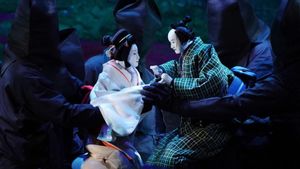Canadian sports fans have begun to vocally express disapproval of the United States national anthem before major sporting events, as seen during recent games involving NBA and NHL teams. This phenomenon escalated over the weekend of March 2-3, 2023, particularly during the Toronto Raptors matchup against the Los Angeles Clippers and NHL games featuring the Ottawa Senators and Minnesota Wild. Fans’ responses came just hours after U.S. President Donald Trump enacted significant tariffs on imports from Canada, igniting both economic tensions and patriotic feelings.
At the Scotiabank Arena on Sunday, fans of the Raptors cheered as the 15-year-old anthem singer began the performance of “The Star-Spangled Banner,” only to rapidly switch to booing as the song continued. This led to cheers when Canada’s anthem, “O Canada,” was sung. Similarly, at the Canadian Tire Centre, the American anthem was met with jeers just prior to the Senators’ dominating 6-0 shutout of the Wild. The swift shift from applause to booing mirrors the growing frustrations stemming from recent political developments.
Trump’s announcement on tariffs included drastic tax increases of 25% on imports from Canada and Mexico, alongside 10% taxes on energy imports, including oil and natural gas. These decisions understandably precipitated the show of discontent from Canadian sports fans, who felt personally affected by actions taken on the international stage. Such booing is rare for national anthems; yet, it has historical precedence connected to other significant political events, such as the U.S. invasion of Iraq.
“No, no, no. But have you ever seen us getting taxed like this?” questioned Raptors forward Chris Boucher when asked about the booing after the game. His comments highlight how the fans’ sentiments directly open up conversations about the broader socio-political relationships between Canada and the U.S. The emotional gravity of these responses cannot be understated, considering sports are often viewed as unifying events where politics should be set aside.
Patrick Kane, Detroit Red Wings forward, acknowledged the changing dynamics, remarking, “I guess you can maybe understand it from this side but seems like it's a thing that's going around the league right now.” His perspective as both a player and American citizens adds nuance to the conversation, emphasizing the complicated feelings surrounding the anthem booings.
Interestingly, fans at NHL and NBA games have used this as their platform to voice discontent, calling attention to the relationship strain caused by recent tariffs. It’s important to recognize the symbolic nature of these moments. The booing not only reflects current discontent but also historical grievances. Public disdain toward the U.S. national anthem recalls past instances when Canadians have used sports to express their opinions, such as during the protests against the Iraq war.
Coaches from both the Raptors and Red Wings, including Todd McLellan and Darko Rajakovic, opted to sidestep political discourse. McLellan stated, “I'm going to separate from what we were all here for was the entertainment value of a hockey game,” asserting the importance of maintaining focus on sports rather than politics. This sentiment reflects the challenges athletes face as public figures caught between their loyalty to their teams and broader political issues.
Rick Tocchet, the head coach for the Vancouver Canucks, mentioned, “I don’t want to go to politics, though,” emphasizing his intention to keep the sport out of political commentary. Nevertheless, the very act of booing suggests these interactions cannot be entirely divorced from the political frame, as how players and fans engage with one another often transcends the game itself.
Canada and the U.S. have shared historical moments tied to national sentiments projected during anthem performances. Historically, the tradition of playing both national anthems prior to games served as solidarity between the two nations, reminding fans of their geographic and cultural ties. The booing incidents signify how rapidly these relations can alter, indicating uncertainty among Canadians who may have once felt closer to their neighbor.
Unfortunately, as tensions rise, national pride may lead to more vocal protests like the booing of the U.S. anthem, serving as potent symbols of the public's sentiment. Fans and players alike may be left wondering what the future holds for cross-border sports relations if current trends continue.



